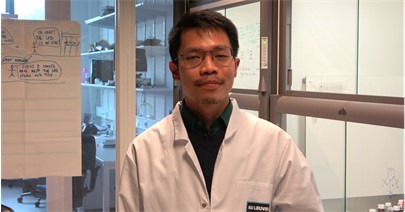
Scholar Interview (December 17, 2020)
Driven by curiosity in materials science and engineering, Alex’s Ph.D. at KU Leuven, in collaboration with the Vrije Universiteit Brussel and imec, tackles the cross-fertilizing fields of porous materials chemistry and nanotechnology. His main work revolves around the thin-film science of metal-organic frameworks fabricated by chemical vapor deposition (CVD) and molecular layer deposition (MLD).
He is passionate about science communication and cutting-edge research for sustainable energy transition technologies—unconfined by conventional subject boundaries. Before embarking on his Ph.D. in Belgium, he started his career at Shell as a Process Engineer, followed by a research stint at the Solar Energy Research Institute of Singapore. He holds a degree in Chemical Engineering from the University of the Philippines.
• Please summarize the research you do and explain why it is significant?
My research tackles the cross-hybridization of porous materials chemistry and nanoelectronics. We are developing a cleanroom-compatible technology focused on depositing metal-organic framework (MOFs) thin films on (functional) surfaces. MOFs are ordered materials with potential voids or spaces at the nanoscale. With its many interesting properties such as porosity, crystallinity, and chemical diversity, paired with a robust fabrication method, MOFs have colossal potential in the future of electronic devices.
• How might your research be used?
MOFs are very tiny porous materials—like a nano-sponge. This fascinating property makes these materials prime candidates for next-generation gas sensors. The “confinement” effect on the pores of MOFs will result in a selective and sensitive sensing platform for next-generation healthcare diagnostics, toxic gas monitoring and abatement systems, and food technology.
• Why is the Park AFM important for your research?
Atomic force microscopy is a staple in my research. It allows us to unravel mechanistic insights, to probe physicochemical properties down to the nanoscale, and to assess the impact of process parameters on the thin film quality. Specifically, I investigate morphological changes of MOF coatings by CVD and MLD, as functions of several variables such as reaction time, temperature, and nature of chemical precursors. The fundamental understanding of these parameters will enable commercial-scale processes and expansion to a wider array of MOF materials.
• What features of Park AFM are the most beneficial and why?
One of the many advantageous features of Park NX-Hivac beneficial for my research is the flexibility to control the atmosphere during measurements. As some of these materials may be sensitive to moisture, it is crucial for us to measure under vacuum conditions. This way, we also mimic the reaction environments inside the reactor.
Most importantly, through my expertise in AFM, I have provided help to my colleagues, in one way or another—for instance, in assisting them in measurements or data processing. This feat is probably the achievement that I am most proud of.
